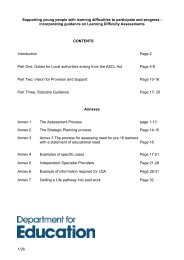Letters and Sounds 1
Letters and Sounds 1
Letters and Sounds 1
You also want an ePaper? Increase the reach of your titles
YUMPU automatically turns print PDFs into web optimized ePapers that Google loves.
5. English words do not end in the letter v unless they are abbreviations (e.g. rev).<br />
If a word ends in a /v/ sound, e must be added after the v in the spelling (e.g.<br />
give, have, live, love, above). This may seem confusing, because it suggests<br />
that the vowels should have their ‘long’ sounds (as in alive, save <strong>and</strong> stove)<br />
but in fact there are very few words in the give/have category (i.e. words with<br />
‘short’ vowels) – they are mostly common words <strong>and</strong> are quickly learned.<br />
6. Elisions, sometimes known as contractions, such as I’m, let’s <strong>and</strong> can’t are<br />
usually easy to spell, but children need to know where to put the apostrophe.<br />
They should be taught that it marks the place where letters are omitted.<br />
7. Confusions are common between their <strong>and</strong> there <strong>and</strong> can persist unless<br />
appropriate teaching is given. There is related in meaning <strong>and</strong> spelling to here<br />
<strong>and</strong> where; all are concerned with place. Their is related in meaning (plural<br />
person) <strong>and</strong> spelling to they <strong>and</strong> them. To avoid confusing children, experience<br />
shows it is advisable not to teach these two similar sounding words there <strong>and</strong><br />
their at the same time but to secure the underst<strong>and</strong>ing of one of them before<br />
teaching the other.<br />
An additional problem with the word their is its unusual letter order. However, if<br />
children know that they, them <strong>and</strong> their share the same first three letters, they<br />
are less likely to misspell their as thier.<br />
8. Giving vowel graphemes their full value in reading can help with the spelling of<br />
the schwa sound. For example, if children at first sound out the word important<br />
in their reading with a clear /a/ sound in the last syllable, this will help them to<br />
remember to spell the schwa sound in that syllable with the letter a rather than<br />
with any other vowel letter.<br />
9. In deciding whether to use ant or ent, ance or ence at the end of a word, it is<br />
often helpful to consider whether there is a related word where the vowel sound<br />
is more clearly pronounced. When deciding, for example, between occupant or<br />
occupent the related word occupation shows that the vowel letter must be a.<br />
Similarly, if one is unsure about residance or residence, the word residential<br />
shows that the letter must be e.<br />
Note: The i before e except after c rule is not worth teaching. It applies only to words<br />
in which the ie or ei st<strong>and</strong>s for a clear /ee/ sound <strong>and</strong> unless this is known, words<br />
such as sufficient, veil <strong>and</strong> their look like exceptions. There are so few words<br />
where the ei spelling for the /ee/ sound follows the letter c that it is easier to learn<br />
the specific words: receive, conceive, deceive (+ the related words receipt,<br />
conceit, deceit), perceive <strong>and</strong> ceiling.<br />
00281-2007BKT-EN<br />
© Crown copyright 2007<br />
<strong>Letters</strong> <strong>and</strong> <strong>Sounds</strong>: Principles <strong>and</strong> Practice of High Quality Phonics<br />
Primary National Strategy<br />
<strong>Letters</strong> <strong>and</strong> <strong>Sounds</strong>: Phase Six
















